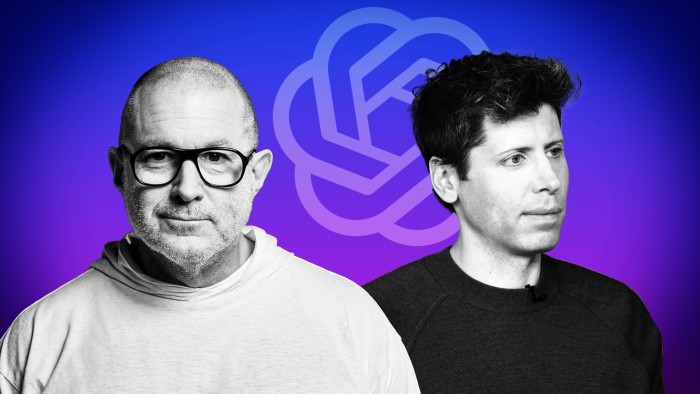Stay informed with free updates
Simply sign up to the Artificial intelligence myFT Digest — delivered directly to your inbox.
OpenAI and star designer Jony Ive are grappling with a series of technical issues with their secretive new artificial intelligence device, as they push to launch a blockbuster tech product next year.
The San Francisco-based start-up run by Sam Altman acquired the former Apple design chief’s company io for $6.5bn in May, but the pair have shared few details on the projects they are building.
Their aim is to create a palm-sized device without a screen that can take audio and visual cues from the physical environment and respond to users’ requests.
People familiar with their plans said OpenAI and Ive had yet to solve critical problems that could delay the device’s release.
Despite having hardware developed by Ive and his team — whose alluring designs of the iMac, iPod and iPhone helped turn Apple into one of the most valuable companies in the world — obstacles remain in the device’s software and the infrastructure needed to power it.
These include deciding on the assistant’s “personality”, privacy issues and budgeting for the computing power needed to run OpenAI’s models on a mass consumer device.
“Compute is another huge factor for the delay,” said one person close to Ive. “Amazon has the compute for an Alexa, so does Google [for its Home device], but OpenAI is struggling to get enough compute for ChatGPT, let alone an AI device — they need to fix that first.”
A person close to OpenAI said the teething troubles were simply normal parts of the product development process.
Multiple people familiar with the plans said OpenAI and Ive were working on a device roughly the size of a smartphone that users would communicate with through a camera, microphone and speaker. One person suggested it might have multiple cameras.
The gadget is designed to sit on a desk or table but can also be carried around by the user. The Wall Street Journal previously reported some of the specifications around the device.
One person said the device would be “always on” rather than triggered by a word or prompt. The device’s sensors would gather data throughout the day that would help to build its virtual assistant’s “memory”.
OpenAI overtook Elon Musk’s SpaceX to become the world’s most valuable private company this week, after a deal that valued it at $500bn. One of the ways the ChatGPT maker is seeking to justify the price tag is a push into hardware.
The goal is to improve the “smart speakers” of the past decade, such as Amazon’s Echo speaker and its Alexa digital assistant, which are generally used for a limited set of functions such as listening to music and setting kitchen timers.
OpenAI and Ive are seeking to build a more powerful and useful machine. But two people familiar with the project said that settling on the device’s “voice” and its mannerisms were a challenge.
One issue is ensuring the device only chimes in when useful, preventing it from talking too much or not knowing when to finish the conversation — an ongoing issue with ChatGPT.
“The concept is that you should have a friend who’s a computer who isn’t your weird AI girlfriend . . . like [Apple’s digital voice assistant] Siri but better,” said one person who was briefed on the plans. OpenAI was looking for “ways for it to be accessible but not intrusive”.
“Model personality is a hard thing to balance,” said another person close to the project. “It can’t be too sycophantic, not too direct, helpful, but doesn’t keep talking in a feedback loop.”
Recommended
OpenAI’s device will be entering a difficult market. Friend, an AI companion worn as a pendant around your neck, has been criticised for being “creepy” and having a “snarky” personality. An AI pin made by Humane, a company that Altman personally invested in, has been scrapped.
Still, OpenAI has been on a hiring spree to build its hardware business. Its acquisition of io brought in more than 20 former Apple hardware employees poached by Ive from his alma mater. It has also recruited at least a dozen other Apple device experts this year, according to LinkedIn accounts.
It has similarly poached members of Meta’s staff working on the Big Tech group’s Quest headset and smart glasses.
OpenAI is also working with Chinese contract manufacturers, including Luxshare, to create its first device, according to two people familiar with the development that was first reported by The Information. The people added that the device might be assembled outside of China.
OpenAI and LoveFrom, Ive’s design group, declined to comment.

